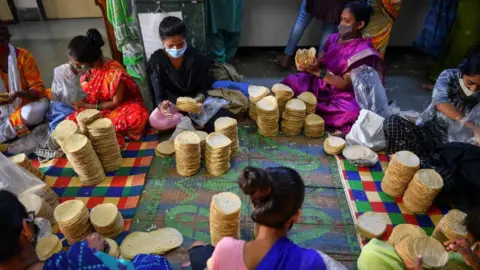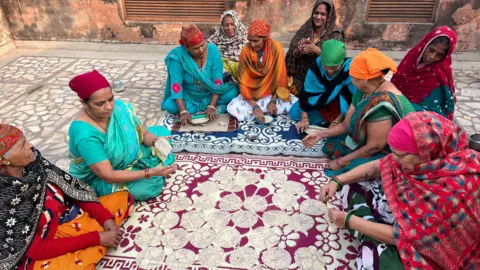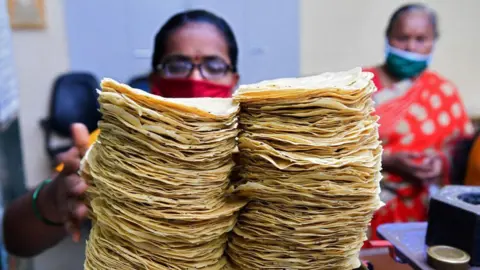How a home-made snack empowered Indian women
 Getty Images
Getty ImagesOn a chilly December morning, a group of women wrapped in colourful saris, warm shawls and woollen caps huddled outside a three-storey building in a busy neighbourhood in Delhi.
Within the walls of the building ran a unit of one of India's oldest social enterprises, owned and run by women.
The co-operative - now called Shri Mahila Griha Udyog Lijjat Papad - was started in 1959 in Mumbai (then Bombay) by seven housewives who made the humble papad or poppadoms, a crispy, savoury snack that is a staple of Indian meals.
Sixty-five years later, the co-operative - headquartered in Mumbai - has spread across India with more than 45,000 women members. It has an annual turnover of 16bn rupees ($186m; £150m) and exports products to countries including the UK and US.
Working mostly from home, the women in this co-operative produce items including detergents, spices and chapatis (flatbreads), but their most-loved product is the Lijjat brand of poppadoms.
"Lijjat is a temple for us. It helps us earn money and feed our families," says Lakshmi, 70, who manages the Delhi centre.
Ms Lakshmi, who uses only one name, joined the co-operative about four decades ago after her husband died, which forced her to look for work.
"I hadn't finished my studies and didn't know what else to do. That's when my neighbour told me about Lijjat," she says.
The decision to join the women's co-operative transformed her life, she says. She now manages 150 women at the centre.
For women like Ms Lakshmi, the co-operative offers a chance to earn a decent income while balancing their work at home.
 Devina Gupta
Devina GuptaEvery morning, the women members take a bus hired by the co-operative to the nearest Lijjat centre. There, they collect their share of pre-mixed dough made with lentils and spices, which they take home to roll into poppadoms.
"I used to go home with this dough and do all my housework, feed my children and sit with my chakla [a flat wooden board] and a belan [rolling pin] in the afternoon to make small round thin papads," says Ms Lakshmi.
Initially, it took her four-five hours to make 1kg of dried lentil papad, but she says she can now produce that amount in just half an hour.
The head office in Mumbai buys raw materials like lentils, spices and oil in bulk, mixes the flour and sends it to Lijjat offices around the country.
Once the women make and dry the poppadoms at home, they deliver them back to the centre for packaging. Lijjat's distributor network then transports the products to retail shops.
The enterprise has come a long way since it was founded.
In the 1950s, a newly independent India was focusing on rebuilding itself, trying to strike a balance between promoting small-scale, rural industries and pushing for large urban factories.
It was also a time when the government owned most of the factories in the country. Life for women was especially challenging as they had to negotiate a deeply conservative and patriarchal society to get educated and work.
The group of women who founded Lijjat - Jaswantiben Jamnadas Poppat, Parvatiben Ramdas Thodani, Ujamben Narandas Kundalia, Banuben N Tanna, Laguben Amritlal Gokani, Jayaben V Vithalani and Diwaliben Lukka - were in their 20s and 30s, living in a crowded tenement in Mumbai and looking for ways to support their families.
Their idea was simple - work from home and earn money by using the cooking skills passed down to them through generations of women.
 Getty Images
Getty ImagesBut they did not have money to buy ingredients and sought financial assistance from Chhaganlal Karamshi Parekh, a social worker.
He offered them a loan of 80 rupees ($0.93; £0.75 at today's rates), which was enough to get started at the time.
But the women soon realised that there were no takers for their poppadoms. Narrating the story, Swati Paradkar, the current president of the co-operative, says that the women had to return to Parekh for help.
He again lent them 80 rupees, but this time with the condition that they would repay 200 rupees to him. Parekh - whom the women called Bappa (meaning father) - and other social workers took the poppadoms to local shopkeepers, who agreed to stock them only if they could pay after the products were sold.
Only one shopkeeper agreed to pay the women immediately. "He began purchasing four to six packets daily and gradually the poppadoms became quite popular," Ms Paradkar says.
As the business grew, more women joined the co-operative - not as employees, but as co-owners with a say in decision-making. The women call each other ben or sister in Gujarati.
"We are like a co-operative and not a company. Even though I am the president, I am not the owner. We are all co-owners and have equal rights. We all share profits and even losses," Ms Paradkar says. "I think that's the secret of our success."
For decades, the co-operative produced its poppadoms without the iconic Lijjat brand name.
In 1966, the Khadi Development And Village Industries Commission, a government organisation to promote small rural industries, suggested that they come up with a brand name.
The co-operative placed an advertisement in newspapers asking for suggestions. "We received a lot of entries but one of our own sisters suggested Lajjat. We tweaked it to Lijjat, which means taste in Gujarati", Ms Paradkar says.
Over the decades, the co-operative has allowed generations of women to attain financial independence.
"Today I have put my children through school, built a house and got them married," says Ms Lakshmi.
"Working here, I have found not just an income but respect."
Follow BBC News India on Instagram, YouTube, Twitter and Facebook
